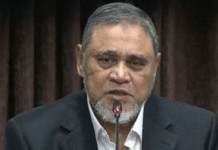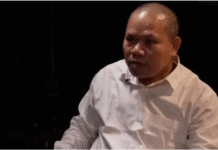The Election Commission headed by Kazi Rakibuddin Ahmad could not live up to people’s expectations in the last one and a half years.
Some of its activities, particularly those on electoral law reforms, have rather appeared as evidence that it has chosen a wrong path.
This has triggered controversies, contributed to reducing people’s confidence in it and will surely weaken this constitutional body again, let alone strengthen it further.
The situation was very bright when Rakibuddin and his team members took the oath of office as chief election commissioner and commissioners, in that order, in February last year. There were many encouraging successes which restored people’s confidence in the constitutional body.
His predecessor ATM Shamsul Huda was the man under whose leadership the EC scaled new heights, through setting new standards. The Huda team gave rise to people’s high expectations which had earlier been damaged by the controversial EC, led by Justice Aziz.
So, what Rakibuddin required to do was to keep up the momentum inaugurated under Huda’s leadership and take forward the good practices set in motion.
Alas! He and his team adopted a reverse stance from the very beginning. They considered the previous EC as their rival and started criticising their predecessors over some actions, including some proposals for electoral reforms.
In light of the experience the Huda-led EC had gathered while conducting the polls during their tenure, they prepared a set of proposals for bringing about more changes in electoral laws to plug the loopholes and to empower the EC further.
They sent the proposals to the law ministry in February 2009 to be translated into law.
However, the law ministry sent back the proposals to the new EC led by Rakibuddin for its consideration and review.
In the name of review, the Rakibuddin team damaged the spirit of the reform proposals prepared by the Huda commission.
The Huda-led EC had drafted the proposal aiming to make it mandatory for the cabinet division and ministries of home, public administration affairs, and LGRD to consult with the EC before taking any decision related to elections during the parliamentary polls period.
The rationale behind this proposal was to allow the EC to have more clout on the government administration during the polls.
But the current EC dropped this proposal when it sent back the amendment proposals to the law ministry last week.
The more surprising task the EC did on Sunday was by deciding not to retain its sweeping authority to cancel an individual’s candidacy in the parliamentary polls for gross violation of electoral laws.
The EC was given this authority before the ninth parliamentary polls in 2008 to make it stronger to oversee the polls.
After the EC’s move on Sunday, the fate of the same authority EC enjoys to conduct the polls regarding other local government bodies, including city corporations, municipalities and upazila parishads, has become uncertain.
The Rakibuddin-led EC also rejected another of its predecessor’s proposals, namely, a restoration of the sweeping authority for the armed forces, deployed during the parliamentary polls, to arrest anyone without warrant for violation of electoral laws.
By rejecting this proposal, the current EC clearly sided with the AL-led government, which scrapped the provision of such authority for the armed forces in 2009.
The Huda-led EC felt the necessity of a restoration of the authority of the armed forces which was given before the 2001 parliamentary polls. But the present EC did not feel that way.
The activities of the present Election Commission have predictably triggered questions about its efficiency, indeed on whether it will be able to conduct the forthcoming parliamentary polls to public satisfaction.
The CEC and his colleagues could not exert their authority effectively at the recently held polls to five city corporations, as seen in their failure to enforce the electoral code of conduct.
Many EC officials, whose confidence was boosted under the Huda-led EC, now feel demoralised over the way the current EC has been running the show.
For Huda, it was a call of duty to lead the EC. But his successor Rakibuddin does not see things that way at all.
Source: The Daily Star









